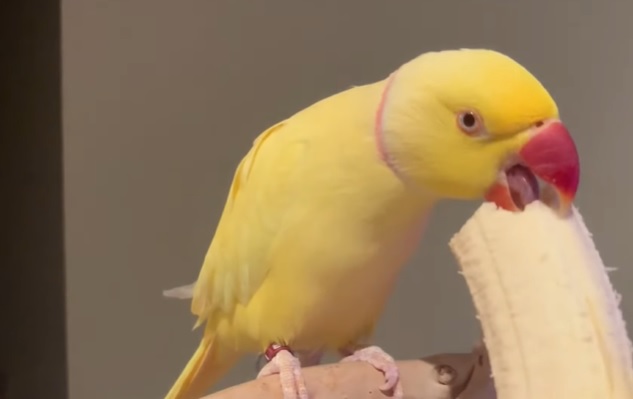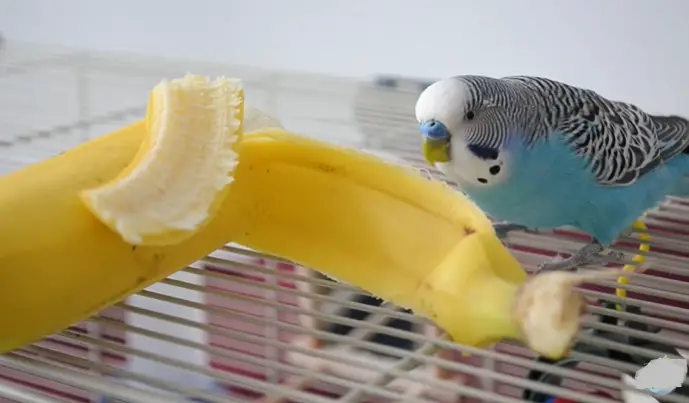Can Parrots Eat Bananas?
Bird owners often worry about providing a safe and nutritious diet for their feathered friends. One common question that arises is whether parrots can eat bananas. Yes, parrots can eat bananas. They are safe for parrots. In this article, we will explore the suitability of bananas as a food for pet birds and provide valuable information to help bird owners make informed decisions about their avian companions’ diet.
Important Nutrient Requirements for Pet Birds

Birds have specific nutrient requirements to maintain their health and well-being. Here are some key nutrients that play a crucial role in their diet:
- Water: Fresh and clean water should be available to birds at all times to ensure proper hydration and bodily functions.
- Carbohydrates: Birds can derive energy from carbohydrates found in grains, fruits, and vegetables. A varied diet that includes these food sources is important.
- Vitamin D: Vitamin D is necessary for proper development in birds, but excessive amounts can lead to toxicity. Consult an avian veterinarian to ensure adequate but safe levels.
- Vitamin A: Vitamin A is critical for vision, cellular differentiation, and immune function. However, excessive amounts can be toxic. The recommended daily dietary requirement for cockatiels is 4000 IU/kg of diet.
- Fatty Acids: A balanced diet with appropriate levels of polyunsaturated fatty acids is essential for birds. High-fat diets with low polyunsaturated fatty acids can predispose birds to atherosclerosis.
- Weight and Obesity: Monitoring weight and providing regular exercise are important to prevent various health issues associated with overweight birds.
- Calcium and Phosphorus: Calcium deficiency can lead to egg binding in laying birds. Seeds commonly fed to captive parrots have low calcium content, while high levels of phosphorus in seeds can bind calcium. The recommended daily dietary requirement for calcium is 1.5 g/kg of the food provided, with an optimal ratio of calcium to phosphorus ranging from 2:1 to 1.5:1.
- Zinc: Zinc is important for feather growth and egg production. Deficiency can lead to decreased feather growth, egg production, inflammation of the crop, and parakeratosis. The recommended daily dietary requirement for zinc is 60 mg/kg of the food provided.
- Selenium: Selenium is important for egg fertility. Deficiency can lead to muscle dystrophy and lower hatchability. Ensure the presence of selenium in the diet.
- Copper: Copper is necessary for growth, feed intake, feather intensity, and eggshell quality. Deficiency can lead to decreased growth, feed intake, and soft eggshells. The recommended daily dietary requirement for copper is 5-10 mg/kg of the food provided.
- Kidney Diseases: Avoid excess vitamin D3 and dietary calcium, as they can contribute to chronic kidney diseases in birds.
- Essential Amino Acids: Birds are unable to synthesize certain essential amino acids and require them in their diet. Gradual dietary changes are recommended when transitioning from low- to high-protein diets to avoid potential health issues.
- Immunity: Avoid deficiency or excess of dietary vitamin A, as both can affect immune function in birds. Vitamin A deficiency in cockatiels may be associated with diarrhea and pneumonia by impairing intestinal IgA response.
Nutrient Profile of Bananas
Bananas are a popular fruit enjoyed by humans, but can they also be safely consumed by parrots? Let’s take a closer look at the nutrient profile of bananas:
| Nutrient | Amount per Tablespoon |
|---|---|
| Carbohydrates | 3.9 grams |
| Vitamin A | 6.0 IU |
| Vitamin D | 0.0 IU |
| Fatty Acids | 0.0 grams |
| Calcium | 0.3 mg |
| Phosphorus | 3.9 mg |
| Zinc | 0.0 mg |
Note: The nutrient information for bananas was collected from the USDA website (source). Please refer to the website for more comprehensive information.
Considering the important nutrient requirements for pet birds mentioned earlier, bananas provide some valuable nutrients. They are a good source of carbohydrates, which serve as an energy source. However, bananas are low in vitamin A and D, calcium, phosphorus, and zinc. It is essential to ensure that these nutrients are adequately provided through a balanced diet.
Bananas are also low in fat and free from polyunsaturated fatty acids. This makes them a suitable choice for birds prone to atherosclerosis. However, it is worth noting that bananas contain natural sugars and potassium, so moderation is key to prevent excessive sugar intake.
Conclusion
In conclusion, parrots can indeed eat bananas. While bananas are not a significant source of essential nutrients like vitamin A, D, calcium, phosphorus, and zinc, they can still be included as part of a varied and balanced diet for pet birds. It is crucial to ensure that all the essential nutrient requirements are met through a combination of different foods to support optimal health and well-being for our feathered friends.
Frequently Asked Questions
- Can parrots eat bananas every day?
- While bananas can be included in a parrot’s diet, it is recommended to offer a variety of other fruits and vegetables to provide a wider range of essential nutrients.
- Are bananas safe for all species of parrots?
- Bananas are generally safe for most species of parrots, but it’s important to consider the specific dietary needs of each species and consult with an avian veterinarian.
- Can parrots eat banana peels?
- Banana peels are not toxic to parrots, but they are difficult to digest. It is best to remove the peel before offering a banana to your bird.
- Can bananas cause obesity in parrots?
- Bananas themselves are not likely to cause obesity in parrots, but it is essential to provide a balanced diet and monitor portion sizes to prevent weight gain.
- Should bananas be the primary source of nutrition for parrots?
- No, bananas should not be the primary source of nutrition for parrots. They should be part of a varied diet that includes a wide range of fruits, vegetables, grains, and other nutrient-rich foods.
Remember, it’s always advisable to consult with an avian veterinarian or a qualified avian nutritionist for personalized advice regarding your pet bird’s specific dietary needs and preferences.
Safe fruits for parrots-
